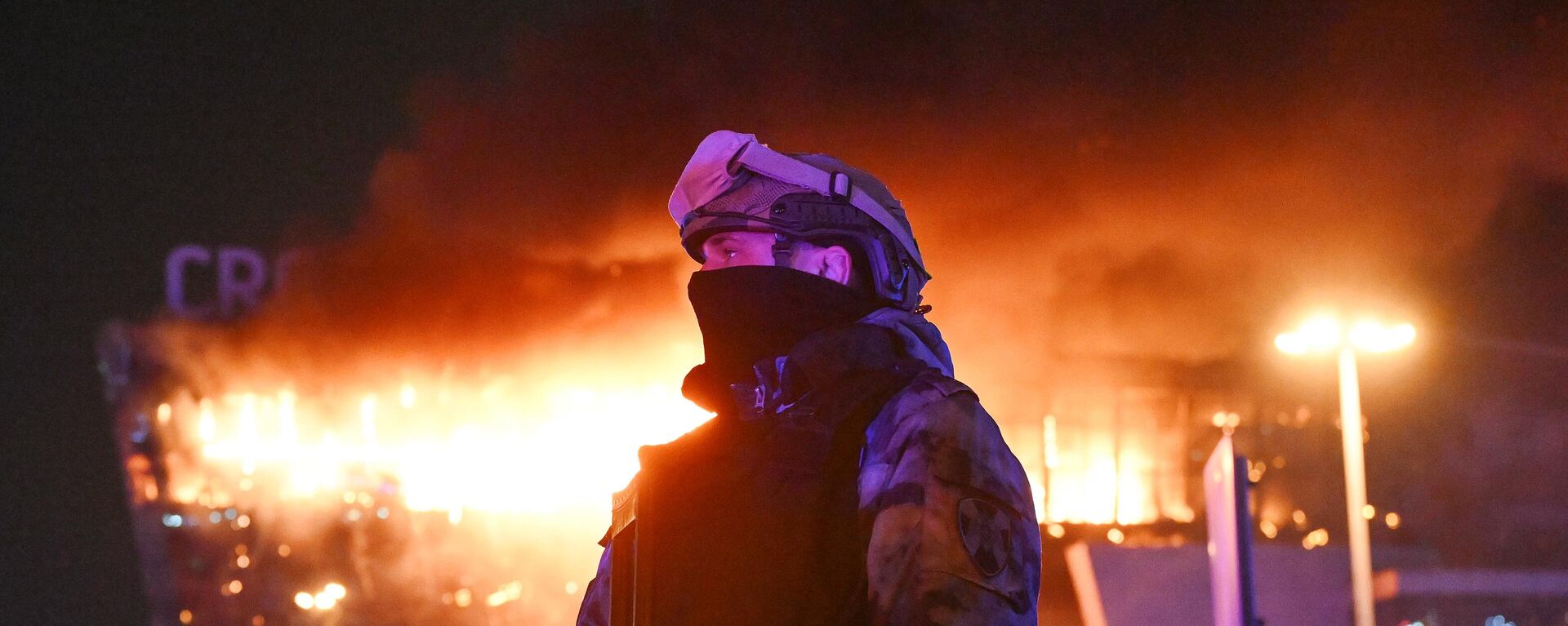Ukraine Likely Had Prior Knowledge of Moscow Terrorist Threat
15:56 GMT 23.03.2024 (Updated: 17:49 GMT 23.03.2024)

© Sputnik / Kirill Kallinikov
/ Subscribe
A group of gunmen opened fire at a concert venue in Moscow on the evening of March 22, killing over 100 people and setting fire to the building.
Eleven suspects have been detained by Russian security services in relation to the terrorist attack, including the four suspected perpetrators who were apprehended as they were trying to flee the country across the border with Ukraine.
During an interview with Sputnik, political and military analyst Sergey Poletaev pointed out that the Russian Federal Security Service (FSB) officially announced that the suspected terrorists had contacts in Ukraine.
According to Poletaev, even if the reports about the perpetrators being Tajikistani citizens are true, the attack in Moscow could have been masterminded either by some kind of Islamist terrorist organization that has ties with Ukraine, or even by Ukraine directly.
In any case, he noted, it appears that the Ukrainian leadership had prior knowledge of this act of terror, “which makes them accomplices, at the very least.”
Poletaev also argued that while the attack was likely planned by professionals, it does not necessarily mean that the perpetrators were equally skilled, with the analyst observing how high school students sometimes kill dozens of people during shooting sprees.
Commenting on the attempts by both Washington and Kiev to hastily deny Ukraine’s trace in this terrorist attack, Poletaev suggested that the West is going to insist that ISIS* alone was responsible.
Thus, he postulated, there will be two narratives – the Russian and the Western – and it all comes down to whose side the “global majority” is going to take.
“It is in our best interests to collate a convincing body of evidence for our case. It would greatly help us with diplomacy,” Poletaev remarked. “We’re talking about the ‘third countries,’ of course, as the West will most likely dismiss any talk of Ukraine’s involvement.”
Seyed Mohammad Marandi, a political analyst and professor at Tehran University, also found it curious that, even when “no real details” about the attack were known, the United States started insisting that Ukraine was not involved.
“It is also very strange that the United States was able to give such a detailed travel advisory or warning about a terror attack naming concerts and giving specifics about an attack in Moscow and large gatherings and all that [previous to the attack],” he added. “So, they have all these specific details, but they were unable to give anything specific to the Russians. This all makes one think that something is very wrong.”
Referring to claims about ISIS being responsible for the attack, Marandi argued that this theory does not necessarily rule out “cooperation between Ukraine and ISIS or the potential role of the United States.”
“The very fact that the United States, from the start, said that Ukraine wasn't involved and the very fact that they gave such a detailed warning to their citizens is raising serious questions. But ISIS and the Ukrainian regime both have very strong connections with the West,” he elaborated. “ISIS has cooperated with NATO countries, it has cooperated with Israel, and it has cooperated with other American allies in Syria for years. And Ukraine is also deeply dependent on NATO countries.”
Marandi also pointed out that ISIS “has always been focused on the enemies of the United States” whereas the terrorist organization’s attacks on NATO countries or the Middle Eastern powers aligned with the West have been “very rare.”
ISIS (also known as ISIL/IS/Islamic State) is a terrorist group outlawed in Russia and many other countries.


